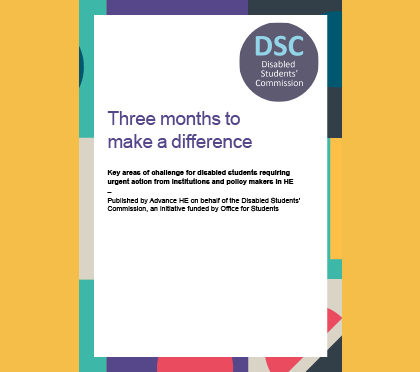With Covid-19 making its resurgence we are seeing greater use of face masks. Some higher education providers have mandated the use of face coverings within indoor spaces.
I, like most other deaf people have no issue with wearing a face mask to play our part in limiting the spread of Covid-19. However, as I depend on lip-reading to communicate, going into an environment where everyone around me has their mouth covered is disconcerting, and at times, alienating.
Imagine being a deaf first year student, living away from home for the first time, trying to get to know your fellow students and find your way around campus. Time and time again you come up against communication barriers - that would be a typical experience in normal times. In the time of Covid, on a campus where everyone is wearing masks, the barriers can feel twice as high.
If you are confident enough, you can get by trying to access shops, bars and reception desks by explaining to staff you are deaf and need to lipread or for them to write things down or use gesture. What is more tricky is if your seminar class tutor is wearing a mask – what are your rights to be able to follow what is being said in the class? Even more challenging are social situations – can you ask your fellow students in the corridor if they could lower their mask for you?
Masks are not currently recommended to be worn in school classrooms by the Government. However, we have received reports of masks being worn by schoolteachers. The same is likely to be happening in universities and colleges. We are really concerned that face coverings are putting deaf students’ education at risk and that being left out from social situations threatens mental wellbeing.
We at the National Deaf Children’s Society have recently written to every vice-chancellor in the UK to ask them to make sure their policies on face coverings take into account the needs of deaf students. In our letter we gave examples of different solutions. There is no one-size fits all approach and different solutions will be used in different circumstances. They include:
- raising awareness amongst staff and students that some students and staff rely on lip-reading and promoting communication tips such as these: bit.ly/keep-it-clear-top-tips
- providing transparent face masks or visors for staff and students who need to communicate with deaf students – note that some transparent masks are poorly fitting and fog up easily so research is necessary to choose the most appropriate model
- supporting students to apply for Disabled Students' Allowances to cover the cost of communication support where classes are not accessible
- recognising exemptions to wearing face masks – for example, the laws for public transport permit travelling companions of deaf people to pull their masks down for lip-reading.
In line with their duties to make reasonable adjustments under the Equality Act 2010, we ask higher education providers to reach out to their deaf students, talk about possible solutions with them and check-in regularly on how things are going. Every deaf young person is different and so it’s important to find out what their needs and preferences are. For example, some will feel that transparent masks do not meet their needs but others will be keen on them.
We’ve been encouraged by some examples of good practice such as that by Nottingham Trent University which has provided clear visors for staff to use when meeting deaf students and promoting our top tips for communication.
For further information and advice higher education providers can contact our free helpline: www.ndcs.org.uk/helpline
Martin McLean is the Post-14 Policy Lead at the National Deaf Children’s Society (NCDS). He has recently written a letter to all UK vice-chancellors, urging them to ensure equality of access to deaf students, in light of any new policies on face coverings introduced for Covid-19.

Find out more about the Disabled Students’ Commission including recent publications: ‘Three Months to Make a Difference', and ‘Considerations for disabled students applying to university’.